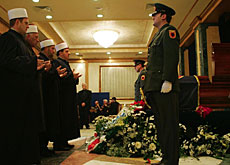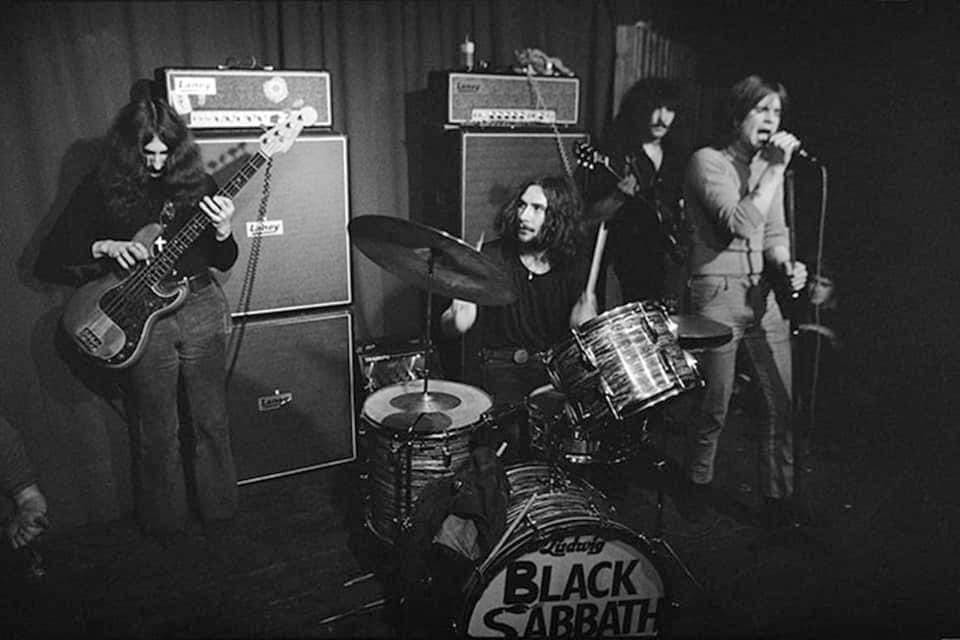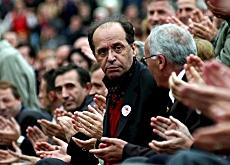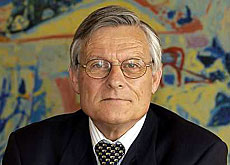
Calmy-Rey joins Kosovo’s goodbye to Rugova

Swiss Foreign Minister Micheline Calmy-Rey – who supports independence for Kosovo - has attended Thursday's funeral of President Ibrahim Rugova.
Switzerland is home to one in ten Kosovans, and Calmy-Rey is one of the few western politicians to have publicly supported the province’s demands for statehood.
Earlier this week Calmy-Rey said she was confident that negotiations on the future status of Kosovo would continue despite the death of Rugova.
The former Serbian province has been administered by the United Nations since 1999 when Nato-led troops drove out Yugoslav troops.
Calmy-Rey said the issue of Kosovo’s status had to be resolved sooner than later, because of the volatile situation in the region.
She reiterated that Switzerland was in favour of formal independence for Kosovo, but stressed the need for a negotiated solution between all parties involved.
Rugova, who was elected president in 2002, was seen by many as the father of the nation. He symbolised peaceful resistance, and was to have led Kosovo’s ethnic Albanian majority towards a compromise in the final status talks.
Power struggle
Ueli Leuenberger, founder and leading member of the Geneva-based Albanian Centre, told swissinfo that a power struggle was inevitable between the province’s leading party, the Democratic League of Kosovo, and other groups.
Hashim Thaci, president of the Democratic Party of Kosovo will play a key role, according to Leuenberger. Thaci studied in Switzerland and helped set up the now disbanded Kosovo Liberation Army militia.
Leuenberger hopes final status talks on Kosovo will lead to independence for the province but with clearly defined guarantees for ethnic minority groups.
“Everything else, including a division of Kosovo, would trigger a war,” he said.
The Swiss foreign ministry shares concerns that the situation in Kosovo could destabilise the region, but is convinced that all sides are aware of the difficult situation and the need for a sustainable solution without much delay.
“Of course Mr Rugova would have played a key part in the status talks,” said foreign ministry spokesman Jean-Philippe Jeannerat. “His death does not make things easier.”
Optimism
Political and cultural organisations and associations representing ethnic Albanians from Kosovo in Switzerland have expressed their sorrow over Rugova’s demise.
“His death was a shock for me and all of us,” said journalist Hevzi Kryeziu. “Not only Kosovo, but the whole Balkan region has lost a great man of peace.”
But Kryeziu doesn’t believe Kosovo will now descend into chaos and anarchy. “The current administration and existing institutions work very well,” he told swissinfo.
He ruled out a power struggle for the succession of Rugova and is convinced that local politicians will be aware of the heavy responsibilities if they are vying for office.
“I still hope Switzerland will remain committed to Kosovo independence,” said Kryeziu.
Peaceful transition
Other representatives are also hoping for a peaceful transition towards freedom and independence in Kosovo, not least for the image and the integration of Kosovans in Switzerland.
Shefget Cakolli from the Albanian Culture Organisation in Winterthur is optimistic, although he can’t think of an obvious successor to Rugova.
“Only a small minority refuses any dialogue – the overwhelming majority wants peace and freedom,” he said.
swissinfo, Jean-Michel Berthoud
There are about 200,000 ethnic Albanians in Switzerland – equivalent to 10% of the population of Kosovo.
Ethnic Albanians became the second biggest foreign community in Switzerland in the 1990s.
Germany is home to 400,000 ethnic Albanians, but Switzerland has the largest number of Kosovans in relation to its population.
Switzerland has deployed some 200 peacekeepers in Kosovo which has been under UN administration since 1999.
Ibrahim Rugova was a founding member of the Democratic Alliance of Kosovo in 1989 when the Serbian leadership suspended the autonomy of Kosovo.
He led a campaign of passive resistance against the regime of Slobodan Milosevic and set up a virtual parallel state.
In the conflict in the late 1990s Rugova’s influence waned at the hands of radical groups, including the Kosovo Liberation Army militia.
In 2000 he returned to a dominant position and was elected president of Kosovo.

In compliance with the JTI standards
More: SWI swissinfo.ch certified by the Journalism Trust Initiative





































You can find an overview of ongoing debates with our journalists here . Please join us!
If you want to start a conversation about a topic raised in this article or want to report factual errors, email us at english@swissinfo.ch.